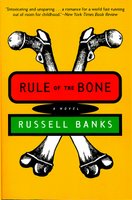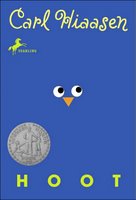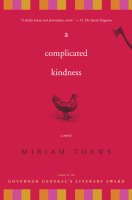 Judy read Asylum for Nightface by Bruce Brooks
Judy read Asylum for Nightface by Bruce Brooks"A 14-year-old boy is shocked when his hash-smoking parents return from vacation as zealous converts. "Some readers may be put off by the author's satirical depiction of born-again Christians, others will applaud his attempt to challenge fundamentalism," said Publisher's Weekly. Ages 12-up. Judy pointed out that though she wasn't quite done with the book it seemed to be heading for a grim ending.
Larry read Lyddie by Katherine Paterson

"In 1843, three years after her father abandons his failing Vermont farm, 10-year-old Lyddie and her younger brother Charles are hired out as servants, while Mama and the two youngest children go off to live with relatives. After spending a grueling year working in a tavern, Lyddie flees to Lowell, Mass., in hopes of finding a better job that will provide enough income to pay off farm debts and allow the family to be reunited. Life continues to be a struggle after she is employed in a cloth factory, but Lyddie finds refuge from wretched working conditions by burying herself in books. Learning that she cannot return home--the family farm has been sold to Quaker neighbors--the girl is seized by a burning desire to gain independence by attending college. Readers will sympathize with Lyddie's hardships and admire her determination to create a better life for herself. Paterson clearly depicts the effects of poverty during the 19th century, focusing on the plight of factory workers enslaved by their dismal jobs. Impeccably researched and expertly crafted, this book is sure to satisfy those interested in America's industrialization period." Ages 10-14. says Publisher's Weekly.
Those who'd read this book before talked about how it didn't have a romantic ending and instead showed some independence of spirit in how Lyddie is determined to have her "own life."
Carmyn read Rule of the Bone by Russell Banks

"Flunking out of school and already hooked on drugs, the 14-year-old narrator, secretly molested by his stepfather, emotionally abandoned by his weak mother, leaves his mobile home in the depressed upstate New York community of Au Sable and becomes a homeless mall rat. In a burst of bravado, he acquires a crossed bones tattoo, changes his name from Chappie to Bone, and attempts to find some focus in his dead-end existence. Convinced that he is destined for a criminal career, Bone vents his anger in acts of senseless destruction. His vulnerability and his need for love and direction are fused when he and a seven-year-old waif he has rescued from a pedophile take refuge in an abandoned schoolbus with an illegal alien from Jamaica called I-Man, whose Rastafarian wisdom and gentle demeanor are fed by liberal consumption of marijuana, which he deals. It is when Bone follows I-Man to Jamaica that the narrative falters. Though the drug-permeated Jamaican milieu is portrayed with impressive authenticity, the improbability of Bone's macabre adventures there frays the plot's credibility. The novel's strengths-Bone's cool, wisecracking voice and colloquial speech, the details of an adolescent's culture-are diluted by its excesses-too many descriptions of marijuana highs, too many coincidences. Yet one finishes the book with indelible sympathy for tough-guy Bone, touched by his loneliness, fear and desperation, and having absorbed Banks's message: that (as he said recently), society's failure to save its children is "the main unrecognized tragedy of our time." said Publisher's Weekly.
I really didn't enjoy this book and I'm not sure I would recommend it.
Marci read Gifts by Ursula Le Guin

"Grade 7 Up–In this well-realized fantasy, the people of the Uplands have unusual and potentially dangerous abilities that can involve the killing or maiming of others. Gry can communicate with animals, but she refuses to use her gift to call creatures to the hunt, a stance her mother doesn't understand. The males in Orrec's line have the power of unmaking–or destroying–other living things. However, because his mother is a Lowlander, there is concern that this ability will not run true to him. When his gift finally manifests itself, it seems to be uncontrollable. His father blindfolds him so that he will not mistakenly hurt someone, and everyone fears him. Meanwhile, Ogge Drum, a greedy and cruel landowner, causes heartache for Orrec and his family. There is a strong sense of foreboding throughout the novel. The characters, who are well rounded and believable, often fail to understand the extent of the responsibility that comes with great power. In the end, Gry and Orrec come to recognize the true nature of their gifts and how best to use them. Readers can enjoy this story as a suspenseful struggle between good and evil, or they can delve deeper and come away with a better understanding of the choices that all individuals must make if they are to realize their full potential. An excellent choice for discussion and contemplation."–School Library Journal
I could see Marci wasn't "in love" with this book. She tried to stretch herself by choosing a fantasy title and in the end I am not sure this was the choice. Several of us had read other books by Ursula Le Guin and enjoyed them very much. Like, Kristi, I would recommend A Wrinkle in Time above all others.

Pam read Hoot by Carl Hiassen
"With a Florida setting and pro-environment, anti-development message, Hiaasen returns to familiar turf for his first novel for young readers," wrote PW. "Several suspenseful scenes, along with dollops of humor, help make this quite a hoot indeed." Ages 10-up. Publishers Weekly
Everyone had read this one but Larry and we'd all recommend it. Larry and Judy had each read some of his books for adults as well. Sick Puppy and Skinny Dip were mentioned. Apparently he's got quite the sense of humor but those are definitely "adult" as in not aimed at a middle school audience.
and Zlata's Diary by Zlata Filipovic
From the Publisher

"When Zlata's Diary was first published at the height of the Bosnian conflict, it became an international bestseller and was compared to The Diary of Anne Frank, both for the freshness of its voice and the grimness of the world it describes. It begins as the day-today record of the life of a typical eleven-year-old girl, preoccupied by piano lessons and birthday parties. But as war engulfs Sarajevo, Zlata Filipovic becomes a witness to food shortages and the deaths of friends and learns to wait out bombardments in a neighbor's cellar. Yet throughout she remains courageous and observant. The result is a book that has the power to move and instruct readers a world away. "
Pam and Larry agreed this was no Anne Frank. Instead the story fell a little flat. Wanting to give the book the benefit of the doubt, we decided something was "lost in translation."
and A Complicated Kindness by Miriam Toews
 From the Publisher
From the PublisherIn this stunning coming-of-age novel, award-winner Miriam Toews balances grief and hope in the voice of a witty, beleaguered teenager whose family is shattered by fundamentalist Christianity.
"Half of our family, the better-looking half, is missing," Nomi Nickel tells us at the beginning of A Complicated Kindness. Left alone with her sad, peculiar father, her days are spent piecing together why her mother and sister have disappeared and contemplating her inevitable career at Happy Family Farms, a chicken slaughterhouse on the outskirts of East Village. Not the East Village in New York City where Nomi would prefer to live, but an oppressive town founded by Mennonites on the cold, flat plains of Manitoba, Canada.
This darkly funny novel is the world according to the unforgettable Nomi, a bewildered and wry sixteen-year-old trapped in a town governed by fundamentalist religion and in the shattered remains of a family it destroyed. In Nomi's droll, refreshing voice, we're told the story of an eccentric, loving family that falls apart as each member lands on a collision course with the only community any of them have ever known. A work of fierce humor and tragedy by a writer who has taken the American market by storm, this searing, tender, comic testament to family love will break your heart."
Both Pam and Judy read this one and part of the attraction was the regional nature of the story. Pam compared it to a different memoir she'd just read The Glass Castle by Jeanette Walls and explained why the Walls book was such a superior book, despite the fact that one was fiction and the other a memoir. For her the construction of Castle gave the reader a better sense of WHERE the story was headed and she felt that was something A Complicated Kindness lacked. Direction and Conclusion. It just sort of fizzled out. Still, it sounds like it was interesting.
Kristi read Night of the Twisters by Ivy Ruckman
Children's Literature - Reviewed by Anne Marie Pace

"Based on the true events of June 3, 1980, in Grand Island, Nebraska, this novel chronicles the experiences of fictional character twelve-year-old Dan Hatch and his friend Arthur on a night when seven tornadoes battered the area, destroying over 500 homes and leaving four people dead. Alone with Dan's baby brother, Dan and Arthur have to use every scrap of courage they can find to keep themselves and the baby safe, reunite with their families, and eventually save an elderly neighbor. Ruckman's careful detailing of the tornado hitting the house and the ensuing damage, along with the destruction of the town, bring the events vividly home to the reader. Some adults might question Dan's mother's decision to allow the boys to reenter the destroyed, and now dangerous neighborhood in order to find Mrs. Smiley while she stays behind to care for the baby, but kids will find it exciting and daring. Upper elementary students who love adventure will race through this fast-paced story. Ages 8 to 12."
No comments:
Post a Comment